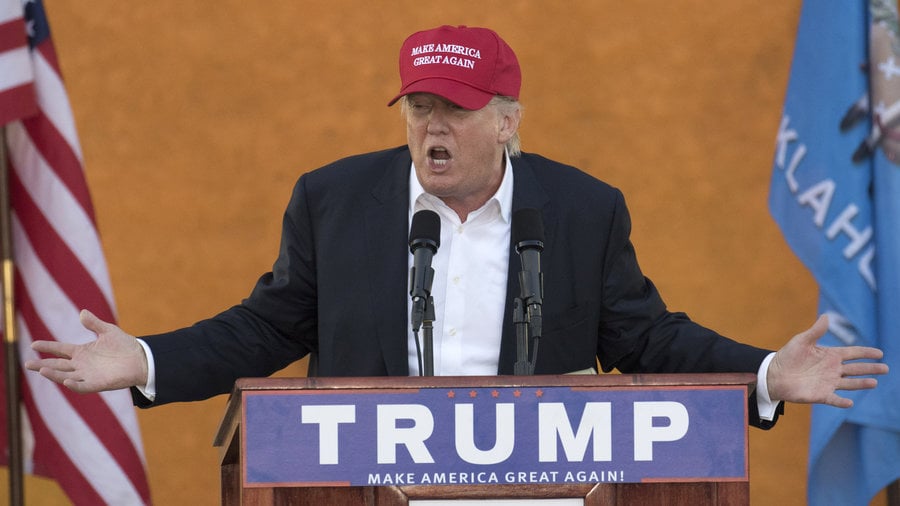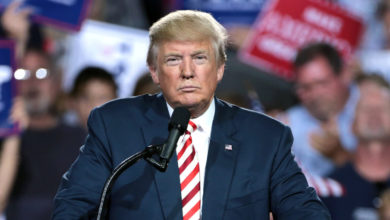NEW: Listen to this article in audio form.
The Democratic Party establishment and the major capitalist-owned media have been waging a low intensity war against the Bernie Sanders presidential campaign for the past year and it is not working too well. Now these attacks are escalating. If Sanders continues to succeed, the floodgate of scurrilous and demonizing assaults will open, just as happened to Jeremy Corbyn in Britain.
For the past 12 months, almost all of the ruling class centers of power have been arguing that Sanders is a socialist and thus “too left”; that his medical reforms “are too expensive” and will break the bank; that he “can’t beat Trump”; or, in the aftermath of his heart attack, that he is not “healthy enough,” which goes along well with the mantra that he is “too old.” At the last debate CNN and Elizabeth Warren conspired to set up Sanders as “sexist,” yet another argument to add to the list. These attacks on Sanders have not worked.
What’s the real reason the ruling class is so alarmed?
What has become crystal clear is that the Democratic Party establishment and its echo chambers in the “free press” clearly would favor four more years of Donald Trump over Sanders, a self-identified democratic socialist, in the White House. One must take a moment and ask: Why is this? By European standards Bernie Sanders would be an acceptable center-left politician. He would not be perceived as a danger to the existing social order. What is the U.S. ruling class so afraid of? Why is the Democratic establishment trying to destroy the Sanders campaign?
The ruling class and its two political parties rightly fear that a new, truly radical and even pre-revolutionary mass movement can quickly sweep through the country as it did in the 1930s and at the end of the 1960s. The Sanders electoral campaign itself is not that, but insofar as it is exciting and raising the expectation of millions who want to win substantive reforms by fighting the billionaire class, it presages what is to come. Sanders, the individual, may turn out to be an accidental political figure who spent a lifetime in the hallowed halls of the bourgeois Congress barely causing a stir, but whose presidential campaigns became a vessel and a catalyst for something more enduring – a movement of millions of people who are demanding radical solutions to the grievous injustices caused by plutocratic capitalism.
The ironies of history
The country is badly in need of a mass, energized movement for radical change. It may be an irony of history that such a radical break from the established order could take shape from within arenas and institutions that constitute a center of ruling-class political legitimacy. But history is filled with such ironies.
Nascent radical mass movements throughout the centuries have often first taken shape where the line of least resistance appears in the old order. Here, the path of least resistance is the elections. People in the United States are familiar with elections. The process, symbols and iconography of the elections are accepted as places for heated discourse and heated debate. It is the main political form that can imbue a political program with instant “legitimacy.” In every school, it is where children are taught they must try to make change — a point reinforced every day in the media.
The notion of making change through other means such as workplace action and street protest, let alone more militant forms, is almost exclusively learned through interaction with people’s movements and with radicals. From the standpoint of those fighting for radical and revolutionary change, a fundamental lesson is that the U.S. electoral form of government has functioned more than anything as a deception — a way of giving the illusion of choice that masks the dictatorship of the capitalist class. That is still its main function.
Socialist tactics
But socialist tactics have to be considered and decided based on the state of class-consciousness of the entire working class, and appreciation of where we are in the historical process, and what is most essential at our current juncture. Just having the conviction as revolutionary socialists that the capitalist system fundamentally cannot be reformed, and that the Democratic Party would sooner come apart than be transformed, is not sufficient to draw out a tactical orientation. The question is how to fight alongside and to an extent merge with masses of people who are in their own process of struggle, so that such conclusions can be tested and proven in real life.
For our purposes here, the point is that it is not surprising that the mass reawakening of anti-capitalist and pro-socialist consciousness would register profoundly in the electoral realm, the path of least resistance. For tens of millions, it feels more legitimate and more possible to identify as a socialist or promote a socialist candidate in an election cycle rather than at a militant street protest or barricade. Given the relative smallness and limited influence of the revolutionary socialist trends in the United States, with whom these tens of millions have largely never interacted, how could it be otherwise? That the form of this struggle is currently inside the Democratic primary contest in some ways obscures its potentially radical or even revolutionary next manifestations.
The ruling class and its “thinkers,” however, are keenly aware that such trends can morph quickly into a truly mass, militant movement against a system dominated by billionaires. The ruling class, because of its role in society, is more acutely class conscious than the classes over which they dominate. They fear more than anything a new consciousness arising from the mass of the people who, should they begin to first stir and then move together with new demands, could become an irresistible force.
So far, the dynamic surge of the Sanders campaign reflects both the nascent mass movement for radical change and further stimulates this phenomenon inside the United States. The last year has witnessed a wave of mass protests all over the capitalist world. The subterranean yearnings for radical change are starting to burst out into the open, above ground, and they are rattling the existing social order and the ruling classes from Chile and Ecuador to Sudan, France, Lebanon, Iraq and beyond.
This yearning for change has not come all at once. It has been developing for nearly a decade. The Occupy movement in 2011 showed the potential for it when it burst onto the political scene. It spread like wildfire before it collapsed under the weight of both state repression and the folly of anarchist tactics. The Arab Spring started with the same impetus and the same dynamism but it too collapsed for multiple reasons, including the absence of an experienced revolutionary leadership capable of circumnavigating such troubled waters, the inability to stir the countryside and the opportunist intervention of imperialism.
Three years later, the rebellion in Ferguson, Missouri, ignited another new national movement against racism and for Black freedom and equality. Rebellion and resistance are in the air once again in 2019 and 2020 in the United States and around the world – and the ruling class and its two political parties inside the United States are scared. The billionaires and bankers do not actually fear Sanders the person at all, but they do fear that his campaign is becoming a springboard for something much larger and more radical. The Party for Socialism and Liberation believes that this is the primary basis to evaluate the Sanders campaign and determine socialist tactics to intervene in the current political struggle.
Sanders’ insurgency against the Democratic establishment
Sanders is running against Trump but his main foes come from within the Democratic Party elites, and thus his campaign presents itself as an insurgency against the Democratic Party itself.
The adversarial relationship between the Democratic Party and the Sanders campaign is a widely recognized fact. Sanders himself said at his very large closing campaign rally ahead of the Iowa caucus, “We are taking on the entire political establishment, both the Republican and the Democratic establishment.” Failed presidential candidate and longtime leading imperialist John Kerry was overheard by an NBC news analyst talking on the phone about “the possibility of Bernie Sanders taking down the Democratic Party — down whole.” Rahm Emanuel , former Chicago mayor and Obama’s chief of staff, warns of “a rupture in the party that is irreparable.” Sources close to former president Obama say he will only intervene forcefully in the primary on one condition: if Sanders were to win in Iowa and start to gain momentum. Stopping Sanders is now their top priority.
Another issue that all socialists must consider is the extent to which this race is being shaped by both major parties as a referendum on socialism in the United States. Trump is organizing his 2020 campaign around the fight to save the country from socialism. He called Sanders a “communist,” who is “far beyond a socialist.” Of course he is not the first Republican to use false anti-communist attacks to attack the Democratic nominee. That was a characteristic of the right-wing campaigns against Obama too, despite him being a center-right neoliberal candidate. But what makes this year different is that for the first time in modern history, the Democratic Party is mirroring these talking points against its own candidate, emphasizing that socialism can never win in the United States.
The Sanders campaign is, at this moment, the vessel for a progressive, vaguely socialist insurgency within the confines of the Democratic Party. The Democratic Party has consistently acted against the interests of working people in the United States while trying to present itself as the only option for progressive values. It is a brake on the development of an independent and militant movement in the country. Socialists who understand the Democratic Party is a ruling class party that can not be reformed should support this insurgency.
After the primaries
If Sanders fails to win the nomination or has it stolen from him, he has pledged to support the party’s pro-ruling class nominee in the general election. He did the same in 2016 when he campaigned for capitalist war hawk Hillary Clinton. If Sanders again abandons his own movement by supporting a ruling class candidate in 2020, the movement should refuse to follow him; it should refuse to be a tail to the kite of either wing of the capitalist political machine and the military-industrial complex. It should continue building its own grassroots base and promoting the socialist movement in confrontation with the reactionary Democratic Party elites. That would make it a genuine resistance movement not only to Trump but also his super-reactionary war-mongering foes in the Democratic Party leadership.
In response to the attacks against Sanders, his campaign has moved to the left on domestic issues and grown in popularity, while broadening its base of support among young people, working-class voters overall, in Black and Latino communities, among women, the LGBTQ community and other sectors of society. These sectors seek radical solutions to the grotesque levels of inequality that are the fundamental feature of late-stage capitalism. One such grotesque feature is evident in the fact that Jeff Bezos “earned” an additional $12 billion on January 29 — one single day — at the same time that the media reported soaring levels of homelessness among working families.
Simultaneously, in the face of the establishment’s attacks and pressure, Sanders has either embraced the ruling-class narrative on Venezuela, China and Russia, or has offered little or very little real opposition to the dominant foreign policy positions of the imperialist establishment. Sanders undoubtedly hopes this will make him more “respectable” in the eyes of the corporate media, but the deeper effect is to lock the budding mass socialist consciousness to the imperialist status quo, keeping that potentially radical sentiment from moving too far left in the direction of internationalism.
What does critical support mean?
Socialists can join the insurgency against the Democratic Party establishment without becoming Bernie Sanders followers or uncritically parroting any and all positions adopted by him. Critical support to the Sanders campaign means that when Sanders takes reactionary positions there should be no holding back on open criticism.
Sanders’ foreign policy positions are not anti-imperialist or socialist. Yes, he has a toned-down, softer and more liberal foreign policy than the other Democrats. Undoubtedly, governments in Cuba, Venezuela, Iran and among Palestinians would consider a Sanders presidency a big step forward by the standards of who his competitors are, and the conduct of previous presidents. But his foreign policy accepts and promotes the narrative of the empire and supports imperialist sanctions against targeted countries.
For instance, when Sanders was one of just two members of the Senate to vote no in June 2017 on a new sanctions resolution against Russia, North Korea and Iran, he made it clear that he was working within the Obama-approved framework and was not taking a radical departure from the ruling class consensus. He explained in a video to prove that his vote should not be considered an outlier or radical shift: “While I support sanctions on Russia and North Korea, I voted against the sanctions bill last week because it contains sanctions on Iran that I believe could endanger the Iran nuclear agreement. This agreement was President Obama’s most important foreign policy achievement, and President Trump has made clear his intention to destroy it. Progressives must get mobilized to protect it, just as we did with the Affordable Care Act!”
The PSL’s socialist presidential campaign & building a mass movement for change
The Party for Socialism and Liberation is running its own socialist campaign for president. This campaign will promote a genuine socialist and internationalist program and thereby provide a real definition to socialism. Gloria La Riva is running for president and her running mate is Native activist and political prisoner Leonard Peltier, who has been unjustly incarcerated for 44 years.
Our campaign is reaching out across the country to explain the urgency of the struggle for socialism as the only answer to the existential threats to life on the planet due to climate change, the growing war danger, and deepening poverty based on job destruction. These existential crises are all based on capitalism, a system that puts the insatiable quest for profits for a small ruling class over all else.
The PSL’s program has similarities and differences with that of Sanders. We wholeheartedly support the far-reaching reforms he demands, including improved Medicare for all people, elimination of student debt, dismantling the system of mass incarceration, full abortion rights and more. Winning these much needed basic reforms will require building a mass, militant working-class movement. Even if Sanders were elected president the capitalist centers of power would do everything, and we mean everything, to prevent these reforms from being implemented.
Sanders as president would not succeed in implementing these reforms absent a large mass movement. Every significant reform in the capitalist system was won through the hard-fought struggle of the people. It was not a gift from Franklin D. Roosevelt that gave us unemployment insurance, social security or the right to unionize in the 1930s. It was mass strikes, general strikes, sitdown strikes and factory seizures and the building of mass organizations of the unemployed. Likewise it was a radical mass movement in the 1950s and 1960s that led to the passage of the Civil Rights Act and the Voting Rights Act in the mid-1960s, which ended the legal status of apartheid in the United States for Black Americans; and also led to the adoption of Medicare that provided access to health care to the elderly. The ending of the Vietnam War, winning the right to abortion, the passage of marriage equality and the adoption of anti-discrimination measures protecting LGBTQ people — all were the consequences of determined movements by masses of people.
The PSL, like the Green Party and other independent campaigns, will not be allowed to participate in the presidential debates — no matter how many states we get on the ballot. The electoral system is rigged to ensure that only the two ruling-class parties are given a competitive chance to win. The two parties also make ballot access extremely complicated, expensive and subject to expanding obstacles for third-party candidates unless they are a toy of one billionaire or another.
What to do now
Although we are not Democrats, we encourage those voting in the upcoming Democratic Party primaries to vote for Bernie Sanders.
Members of the PSL will be going out to Sanders campaign events to connect with the most radical and committed layers of people drawn to his program and to build relationships that will last far beyond the current election cycle. This is consistent with our Party’s orientation to the 2016 election.
If Bernie Sanders fails to get the nomination, he says that he will campaign for whoever is the candidate in the general election. The PSL will not follow that advice. We will urge people to vote for the La Riva/Peltier ticket instead wherever they have achieved ballot status either as PSL candidates representing the Peace and Freedom Party in California or on other progressive third parties’ ballot lines in other states.
If Bernie Sanders wins the Democratic nomination, in spite of the Democratic Party establishment’s war against him, the PSL will not run candidates in battleground swing states. If Bernie Sanders were to win the Democratic Party nomination and then shift his campaign stance and orientation to the right to appease sections of the ruling class and the Democratic Party leadership elites, we will retain our independent capacity to evaluate, criticize or condemn such moves. Appeasing reactionaries in the ruling class only facilitates the growth of right-wing and ultra-right politics.
In the event of a Sanders versus Trump general election, the La Riva/Peltier campaign running outside of swing states will still make an important contribution to the radicalization of popular consciousness. In a period of intensifying class struggle, independent organization and clarity on the meaning of socialism — and how to achieve it — becomes more necessary than ever.
Tactics can never be absolute, designed for all situations or last forever. On the contrary, revolutionaries must combine a rock-hard adherence to core principles with tactical suppleness to advance the movement for socialism under varying conditions and on shifting terrain. For now, the Sanders campaign represents a dynamic insurgency promoting radical social changes in the face of increasingly stiff headwinds from a criminal ruling class that fears the loosening of its absolute grip over U.S. politics and the economy. We support the insurgency against the reactionaries.






